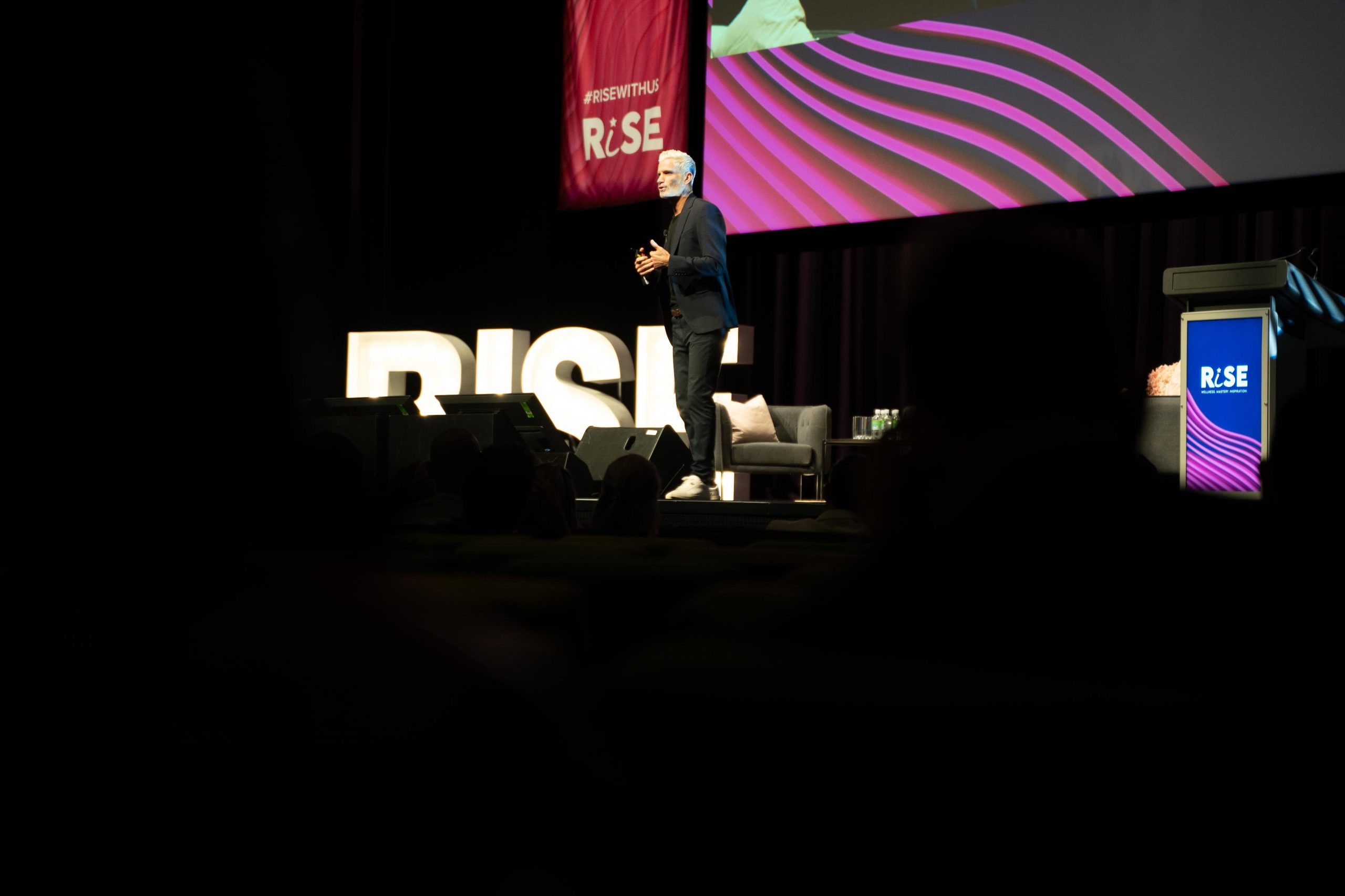
Footballer turned humanitarian Craig Foster has urged the real estate industry to “flex your muscle” for social justice and change the people around you.
A keynote speaker at the Rise 2022 conference, Craig told his audience of more than 1,000 real estate professionals: “I have learned our professions provide the opportunity to do good. By supporting others, we can find meaning and purpose”.
Craig noted that the pandemic had given everyone the opportunity for introspection and to consider how we could help others in society. He welcomed the federal election result, its elevation of women and the changes this would bring in the coming years.
“We can all fly,” he said.
“It’s time for Australian women to fly.
“The question is, where are we going to fly to, and who are we bringing with us? As you rise, bring others with you.”
Craig told his own extraordinary story of galvanising those around him to achieve social justice.
A popular TV pundit for SBS and now pay channel Stan, he continues to use his profile to help asylum seekers in Australia.
Craig was thrust into the global spotlight for his exhaustive efforts to save Bahraini international footballer Hakeem al-Araibi from an inevitable death sentence for social decent.
Yet, Craig said his awareness of social inequity and injustice began years earlier when he joined English Premier League club Crystal Palace, which is based in working-class south-east London.
Playing at Crystal Palace felt like he had stepped into “an alternate world” that was oblivious to the everyday struggle that most of the club’s fans endured.
“I saw extreme wealth, and quite the opposite,” said Craig, who was capped 29 times for Australia’s Socceroos.
“This is a game where billions of dollars change hands, and players exchange houses and cars as if they are jelly beans.
“And then the fans would come, and a £5 a ticket was extremely difficult for them to afford.”
The club employed staff who specialised in providing players with luxury cars, houses and even diamonds. “You would get offered an Aston Martin, Porsche or Ferrari,” he recalled. “If a player did not like his choice, he’d just send it back and get another.
“It was the Hollywood of sport, but it wasn’t real.
“Outside the stadium, people were homeless and sitting (on pavements) with a cup. That dichotomy really struck me.”
Craig said he challenged himself to find in his life “more meaning than changing a car every five seconds”.
“I have found that in recent years,” he said, referring to his humanitarian work.
He is now a board member of the Australian Multicultural Council, an adjunct professor and human rights activist. He works on various social programs for indigenous rights, gender equality, domestic violence and homelessness.
His journey to become one of Australia’s leading humanitarians began with his campaign to free fellow international footballer Hakeem al-Araibi.
Hakeem had settled in Melbourne in 2015 after fleeing Bahrain following imprisonment and torture for participation in a pro-democracy Arab Spring protest.
Three years later, believing this drama in his life was over, Hakeem travelled to Thailand for his honeymoon – and the Bahraini Government pounced, putting a “red notice” on him and demanding his extradition.
“The Bahrain Government and the Bahraini royal family wanted him back – badly. He got on a plane in Thailand perfectly healthy and got to Bahrain with two broken legs and a broken arm,” Craig said.
“He was just a 25-year-old boy, and he was in real trouble.”
Craig said he was asked to help, using his position as a respected former player and TV personality.
“I had never run a campaign,” he said, “but I had a bunch of skills that could help. I didn’t know if I could succeed, and I was fearful I could not. For me, this was a step into human rights and social advocacy, but I knew I could galvanise the sports community and bring some pressure to bear.”
Every day of a 77-day campaign was a “new journey and in many ways frightening”. He found himself pitched not just against the Thai and Bahrain governments but, initially, his own country’s leaders.
He told the Rise audience: “This is where we find true purpose.”
“He was a young Muslim Bahraini and a refugee – these are elements of our society demonised over decades,” Craig said. “How likely was Australia going to support this young man? If you want support, there are certain minority communities who are less likely to receive it.”
“Happily, this might be changing.”
A team of 10 lined up behind Craig to create a social media storm to help Hakeem. Their work “enabled me to be more diplomatic and share more strident messages,’’ which “made an immense impact that largely cracked the case.”
Craig recalled how his house and family had been put under surveillance and the pressure he’d felt from his employer SBS, which became “very uncomfortable” because it was a government-funded broadcaster.
Even while being watched, the Foster family decided together that their sacrifice was worth Hakeem’s freedom.
“It was a moment when big decisions had to be made,” recalled Craig. “My family said, ‘we have to do this whatever the cost’. We got our finances in order so they’d be okay if I didn’t get back from Bangkok.”
He was not alone in his anxiety. Amnesty International workers even made a plan to get Craig out of Thailand by train in an emergency.
A key moment came when Craig confronted FIFA, the global governing body of football. He threatened public humiliation of the organisation if it did not help.
“This is very, very Australian,” Craig said. “When we decide something is right or wrong, we will put ourselves at risk and will not stop.”
As the days went by, players, actors and other celebrities spoke in support of Hakeem, and hundreds of thousands of people followed the drama through Twitter’s #SaveHakeem hashtag and mainstream media.
After a series of negative bureaucratic turns, Craig flew north once more, and he recalled his shock at seeing Hakeem in court, his feet shackled.
“They took his boots and shoes and put him in chains,” Craig said. “He’d done nothing wrong but confront power and be part of peaceful demonstrations in the Arab Spring.”
A coalition of diplomats from 14 countries attended the same court session to show support, apply international pressure and secure Hakeem’s freedom. Finally, Hakeem came home with the help of the Australian Government.
Craig remembered the day he and Hakeem entered Parliament House to meet then foreign affairs minister Marise Paine. Hakeem turned to him and said: “Please don’t send me back. They will kill me”.
Craig was soon fighting again, this time under the banner #GameOver, established to release those trapped in detention centres on Manus Island and Nauru. At the time, some detainees were in their 7th year of incarceration.
On travelling to Papua New Guinea, Craig said “what I found was devastation”. Asylum seekers on Manus Island and also Nauru “were so broken”.
He showed the Rise audience photographs of those he had helped free, including Farhad Bandesh and Mostafa Azimitabar.
Bandesh was a Kurdish asylum seeker who had fled Iran in 2013. After arriving on Christmas Island, he was moved to Manus Island before being transferred to Australia for medical treatment in mid-2019.
After an eight-year ordeal, he walked out of Melbourne Immigration Transit Accommodation carrying his guitar. He has now opened a wine and spirits shop that features a wine called “Game Over” in honour of the campaign that helped secure his freedom.
Azimitabar described the end of his 2,737 days in detention as “the most beautiful moment of my life”. He has gone on to be the first asylum seeker to be nominated a finalist in the Archibald Prize for portraiture.
Craig told his audience: “All these things changed my life. It’s been far more important than kicking any goals or playing any games”.
He had a final message for the Rise delegates.
“That you are all here suggests we have been provided opportunities many people do not have,” he said. “Take one step, strengthen that muscle and change the people around you.
“As you rise, bring others with you.”
